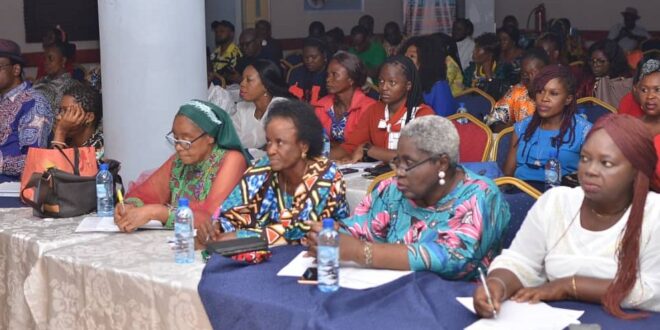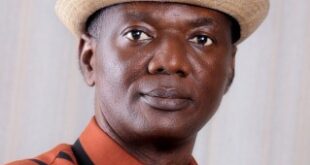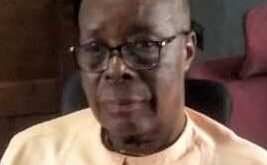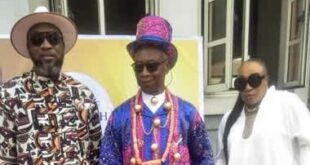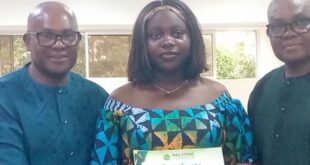By Paul Williams
As the world marked this year’s Earth Day, with the theme: ‘Invest in the Planet,’ non-governmental organisation, Kebetkache Women Development and Resource Centre, has joined the call for a cleaner, healthier and safer Earth.
Executive director of Kebetkache Women Development and Resource Center, Emem Okon, in an address to participants at an event in Port Harcourt, organised by her group to mark the World Earth Day, said more needed to be done to a global environment healthy and safe for future generations.
She noted that “The earth receives heat from the sun and should return part of it through the atmosphere. But due to the greenhouse gases produced by big corporation with big capital, releasing carbon dioxide, methane and other toxic gases into the atmosphere, the heat from the earth cannot dissipate.”
This, Okon said, has led to global warming, melting of the poles, and death of many species, as well as extreme weather conditions.
“As members of grassroots organisations, we are confronting the domination of big polluters. We propose restraint, the restoration of Mother Earth, to reclaim the management of our land, water and forest resources.
“We commit to reclaim our economies and our sources of renewable energy. The commitment is part of what the Eco-Socialist International had documented in their plan of action to reclaim and restore the earth,” she said.
Okon urged the participants to take action, by going “Green” and pushing for an end to gas flaring, while noting that “No earth, no life.”
Environmentalist and National Honours recipient, Dr Nnimmo Bassey, whose poems (‘We Thought it was Oil,’ and ‘When the Earth Bleeds’) were dramatised at the event, noted that the World Earth Day seeks to continuously “remind us of the fact that we are part of the earth, and we all have the responsibility to maintain the earth in a way that it can also help us.”
He lamented that “humanity has seen the earth as a thing, not even as a living being. We have seen the earth as something to be exploited. So we hit the earth, we extract, we damage, we do everything, whatever can bring money. People see the earth, almost as a bank, to keep on withdrawing without depositing anything.”
Dr Bassey, who is director, HOMEF, however noted that “the more we damage the earth, the more life becomes unpredictable. In fact, many of the resources of the earth have been pushed to the extreme, and we stand risk of leaving nothing for the future.
“In fact, this day is a time to really reflect that we need to invest our time, our energy, our thinking on the action to be taken to ensure that the earth remains habitable,” he said.
The impact of oil exploitation activities on the Niger Delta was a meeting point for Dr Nnimmo Bassey, Kebetkache board member, Chief Constance Meju, and deputy executive director of ERA, Mariann Bassey-Orovwuje, who delivered a paper on ‘Invest in our Planet.’
Bassey-Orovwuje pointed out that biodiversity has continued to decline in Africa, with life expectancy also “heading south.”
She suggested that some cases of pipeline rupture in the Niger Delta attributed to third-party interference or sabotage, might really be as a result of equipment failure or rusting pipes, urging the authorities to be more painstaking in investigating oil spill incidents.
Kebetkache board member, Chief Constance Meju, further noted that “Every year, we see things that we were not used to, excessive heat, fire outbreaks, even flooding. These call for reflection on the World Earth Day, especially given the fact that we are in a zone I call triple disadvantaged.
“This is where the golden eggs of the country are laid, but the place we are feeding from is not feeding. People are dying and youths are being forced to adopt vice-actions that are not healthy. The environment is not healthy, whether in the city or in the community. The air is polluted, the water is polluted, the land is degraded. There is hunger and there is also illness,” she said.
Citing cases from Ahoada, Ibeno and other communities in Rivers State, Chief Meju lamented the decline in life expectancy in the Niger Delta, which has been placed at early 40s.
She urged government to resuscitate environmental sanitation officials, forest guards to protect the forests and regulate oil exploitation activities to ensure they are not harmful to the environment.
Kebetkache’s call for a healthier earth was echoed by another group based in Port Harcourt, Zadok Foundation. Its director, Prince Michael Aggrey, urged government, corporations and individuals to invest positively in the planet towards making it a safer and sustainable place.
He pointed out that “protecting the environment matters lo everyone in the home, workplace and the community,” while calling on individuals to conserve energy at home and in the workplace, by turning off lights and electronics when not in use, reducing paper waste and pollution by recycling old computers, phones, among others.
Aside from poem renditions and drama presentation by youths and Niger Delta women, one major feature of the event was the Women Health Tribunal.
Made up of four judges – Prof Sofiri Peterside (chairman), Dr Nnimmo Bassey, Chief Constance Menu and Dr Briggs Bieye, the tribunal received complaints from women in five Niger Delta communities (Biseni in Bayelsa State, Okwuzi, K-Dere in Ogoni, Ibaa and Obelle) against multinational oil companies operating in their communities.
Sifting through complaints of breach of GMoU agreements against Shell (SPDC), environmental degradation against Agip Oil Company, negative cultural influences, loss of livelihood, loss of farmlands and aquatic environment, among others, the tribunal found the multinationals “guilty as charged.”
 PH Mundial – Port Harcourt Online Newspaper News Across The Region
PH Mundial – Port Harcourt Online Newspaper News Across The Region

